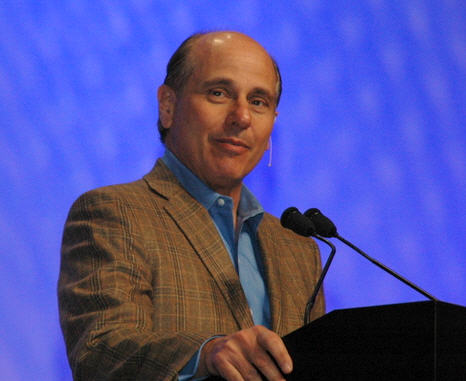Software 2007: Motorola CEO Ed Zander says leave the PC behind

Fresh from blocking Carl Icahn from getting a board seat, Motorola CEO Ed Zander gave a keynote at the Software 2007 Conference. He didn't have anything to say about the boardroom battle, and wasn't asked during a Q&A with conference host M.R. Rangaswami, and gave an overview of Motorola's vision--focusing on connecting the unconnected, unifying the network, "wickedly cool" devices and anytime, anywhere access.
During a post keynote interview, Zander was asked about the forthcoming iPhone. "In some cases, it's going to reinforce what we are doing," Zander said. "The mobile Internet and applications such as multimedia, video, pictures and music are going to happen on these devices and set price points for value."
He categorized Apple as one of the players showing where the mobile world is going. Of course, he isn't going to shout out that the iPhone brings a new and serious competitor to an already very competitive field. His initial response was that Apple should worry about Motorola, as opposed to the conventional wisdom that whatever Apple does is golden, but then said, "Don't quote me."
In the spirit of competition, he teased a new Motorola device that will be introduced in Europe next week and has video moving at 30-frames per second, developed in conjunction with a company producing movies on SD card.
On the topic of competition, Zander said, "We have to pick our spots, and figure out where we can add value in the market and go after that space." He is also banking the mobile devices will become even more dominant compared to PCs, suggesting that a cell phone is more sophisticated in terms of chips, code and other facets than a PC.

He gave out some statistics in support of the mobile revolution--2.7 billion cell phones, 32 cell phones are sold per second, 7 million new subscribers in India per month, 70 percent of knowledge workers will depend on wireless and remote in the next year, and by 2010 80 percent of corporations will have bought their last desk phone (sources of the data were not cited). It's obvious without the numbers that mobile devices, broadband and content are on a rapid acceleration curve globally, and it represents a huge business opportunity.
"I was telling CIOs this morning, leave the PC behind," Zander said, describing how on his 3g Motorola Q he can access CRM, forecasting, quality goals and other applications securely. ""We are moving a lot of micro-apps onto these devices."
One of the big trends driving Motorola's business is the shift to enterprise mobility. "What goes into the enterprise is what goes in hand and with what goes home, just as the PC did," Zander said. He predicted that in the next five years "Internet 2.0," catalyzed by advances, such as WiMax, would create a major shift away from PCs. In his view, mobile devices will replace the PC in many scenarios, which is not unlikely and would be good for his business.
He also predicted that Motorola would invest in more integration and acquisitions to pursue its enterprise mobility goals. Motorola recently acquired Symbol Technologies and Good Technology to expand its footprint in enterprises. Zander can talk the talk, but shareholders and Wall Street are looking for Motorola to walk the walk after losing money and momentum in the last quarter.